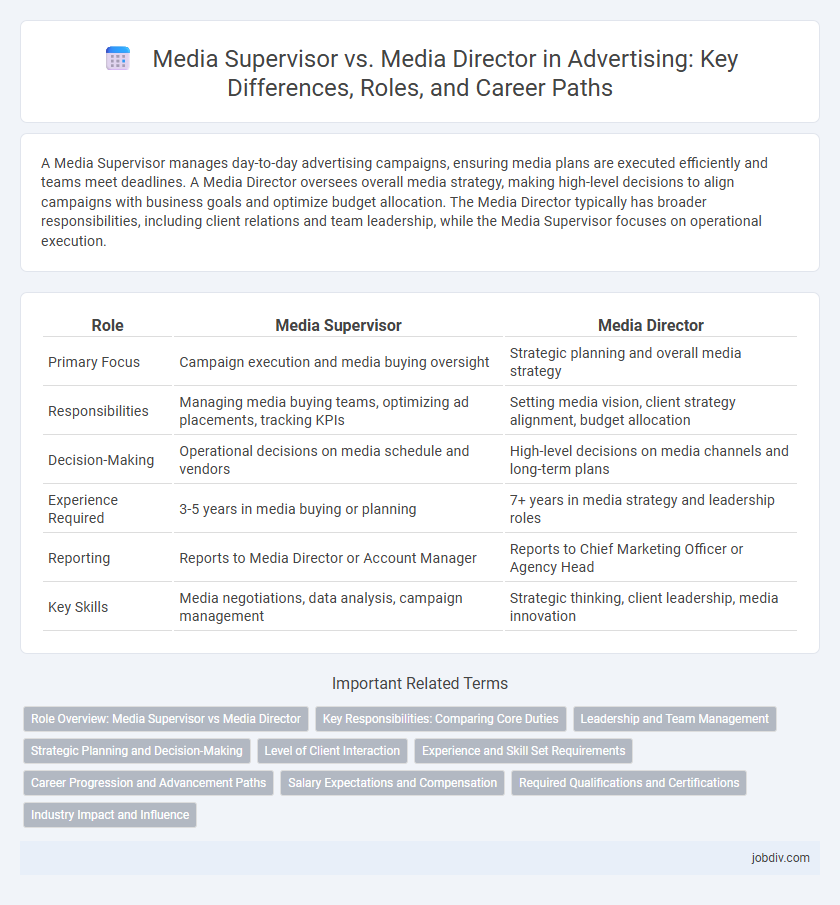A Media Supervisor manages day-to-day advertising campaigns, ensuring media plans are executed efficiently and teams meet deadlines. A Media Director oversees overall media strategy, making high-level decisions to align campaigns with business goals and optimize budget allocation. The Media Director typically has broader responsibilities, including client relations and team leadership, while the Media Supervisor focuses on operational execution.
Table of Comparison
| Role | Media Supervisor | Media Director |
|---|---|---|
| Primary Focus | Campaign execution and media buying oversight | Strategic planning and overall media strategy |
| Responsibilities | Managing media buying teams, optimizing ad placements, tracking KPIs | Setting media vision, client strategy alignment, budget allocation |
| Decision-Making | Operational decisions on media schedule and vendors | High-level decisions on media channels and long-term plans |
| Experience Required | 3-5 years in media buying or planning | 7+ years in media strategy and leadership roles |
| Reporting | Reports to Media Director or Account Manager | Reports to Chief Marketing Officer or Agency Head |
| Key Skills | Media negotiations, data analysis, campaign management | Strategic thinking, client leadership, media innovation |
Role Overview: Media Supervisor vs Media Director
The Media Supervisor manages daily campaign execution, coordinates between clients and media buyers, and ensures alignment with strategic objectives. The Media Director oversees overall media strategy, sets budget priorities, and leads the media team to achieve high-impact advertising results. Both roles drive successful media planning but differ in leadership scope and decision-making authority.
Key Responsibilities: Comparing Core Duties
A Media Supervisor manages day-to-day campaign execution, coordinating media buys, monitoring budgets, and ensuring accurate delivery of advertising content across platforms. The Media Director oversees strategic planning, sets media goals aligned with overall business objectives, and leads cross-functional teams to optimize media investments. Both roles require analytical skills and industry knowledge, but the Director focuses on high-level strategy while the Supervisor handles operational details.
Leadership and Team Management
Media Directors oversee overall strategic vision and team leadership, setting goals and ensuring alignment across campaigns. Media Supervisors manage day-to-day operations, guiding media planners and buyers while monitoring performance and workflow. Both roles require strong leadership skills, but Directors focus on high-level strategy, whereas Supervisors emphasize tactical team management.
Strategic Planning and Decision-Making
Media Supervisors focus on executing strategic plans by coordinating media buying and campaign optimization to ensure alignment with client goals and budget constraints. Media Directors oversee high-level strategic decision-making, defining overall media strategies, setting long-term objectives, and managing team leadership to drive integrated advertising efforts. Both roles require analytical skills, but Media Directors emphasize vision and cross-channel planning, while Media Supervisors concentrate on tactical implementation and daily media operations.
Level of Client Interaction
Media Directors typically engage in high-level strategic discussions with clients, shaping overall campaign goals and ensuring alignment with brand objectives. Media Supervisors manage day-to-day client communications, translating strategic plans into actionable tasks and addressing immediate concerns. The Media Director's role centers on long-term client relationships, while the Media Supervisor focuses on operational client support.
Experience and Skill Set Requirements
Media Supervisors typically require 3-5 years of experience in campaign planning, media buying, and data analysis, with strong skills in client communication and project management. Media Directors demand over 7 years of leadership experience, strategic vision in multi-channel media planning, and expertise in budget allocation, team management, and performance optimization. Proficiency in advanced analytics tools and a deep understanding of market trends differentiate Media Directors from Media Supervisors in advertising organizations.
Career Progression and Advancement Paths
Media Supervisors typically manage day-to-day campaign execution and coordinate between teams, developing tactical skills essential for strategic roles. Advancement to Media Director involves overseeing overall media strategy, budget allocation, and team leadership across multiple projects, requiring strong analytical and managerial expertise. Career progression often includes gaining experience in digital media trends, vendor negotiations, and cross-channel integration to transition from operational to strategic leadership positions.
Salary Expectations and Compensation
Media Directors typically earn between $120,000 and $180,000 annually, reflecting their strategic leadership role in overseeing large advertising campaigns and managing media supervisors. Media Supervisors usually have a salary range of $60,000 to $90,000, as they handle execution and day-to-day media planning tasks under the direction of senior management. Compensation packages for Media Directors often include bonuses and stock options, while Media Supervisors may receive performance-based incentives and professional development opportunities.
Required Qualifications and Certifications
Media Supervisors typically require a bachelor's degree in marketing, communications, or a related field, along with 2-4 years of experience in media planning or buying; certifications like Google Ads or Facebook Blueprint enhance their credentials. Media Directors generally need a bachelor's degree with 5-8 years of progressive leadership experience in media strategy and campaign management; advanced certifications such as Digital Marketing Institute's Pro Diploma or Interactive Advertising Bureau (IAB) credentials are preferred. Strong analytical skills, proficiency in media analytics tools, and formal training in digital advertising platforms are essential qualifications for both roles to optimize campaign effectiveness.
Industry Impact and Influence
Media Supervisors manage campaign execution by coordinating media buys and ensuring alignment with client objectives, directly influencing day-to-day operational success. Media Directors shape broader strategic visions, driving innovation and long-term media planning that impacts agency reputation and market positioning. Their combined roles enhance media effectiveness, shaping industry standards and fostering competitive advantage.
Media Supervisor vs Media Director Infographic

 jobdiv.com
jobdiv.com